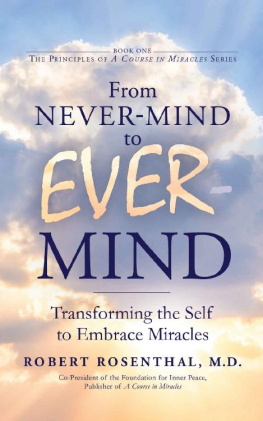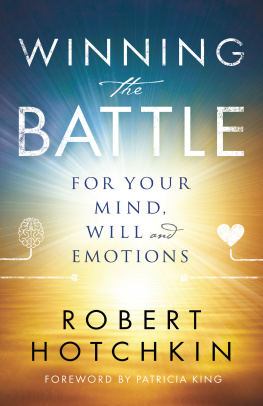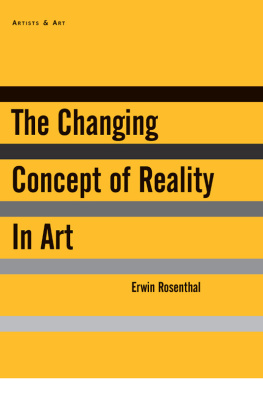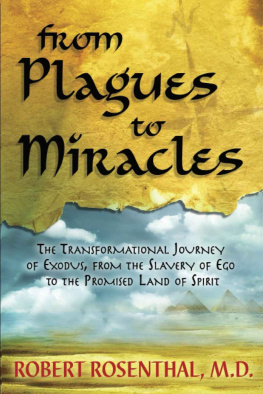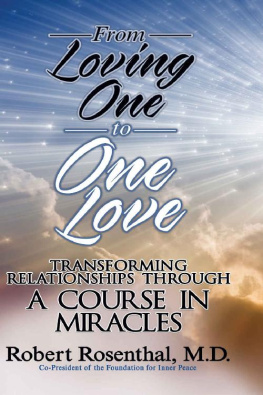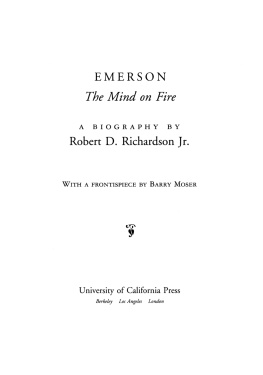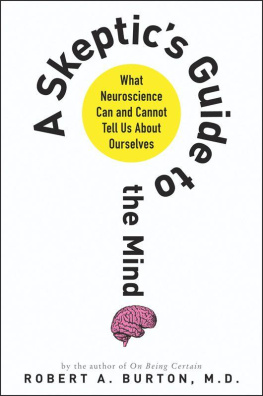Robert S. Rosenthal - From Never-Mind to Ever-Mind
Here you can read online Robert S. Rosenthal - From Never-Mind to Ever-Mind full text of the book (entire story) in english for free. Download pdf and epub, get meaning, cover and reviews about this ebook. year: 2019, publisher: G&D Media, genre: Religion. Description of the work, (preface) as well as reviews are available. Best literature library LitArk.com created for fans of good reading and offers a wide selection of genres:
Romance novel
Science fiction
Adventure
Detective
Science
History
Home and family
Prose
Art
Politics
Computer
Non-fiction
Religion
Business
Children
Humor
Choose a favorite category and find really read worthwhile books. Enjoy immersion in the world of imagination, feel the emotions of the characters or learn something new for yourself, make an fascinating discovery.
- Book:From Never-Mind to Ever-Mind
- Author:
- Publisher:G&D Media
- Genre:
- Year:2019
- Rating:5 / 5
- Favourites:Add to favourites
- Your mark:
- 100
- 1
- 2
- 3
- 4
- 5
From Never-Mind to Ever-Mind: summary, description and annotation
We offer to read an annotation, description, summary or preface (depends on what the author of the book "From Never-Mind to Ever-Mind" wrote himself). If you haven't found the necessary information about the book — write in the comments, we will try to find it.
From Never-Mind to Ever-Mind — read online for free the complete book (whole text) full work
Below is the text of the book, divided by pages. System saving the place of the last page read, allows you to conveniently read the book "From Never-Mind to Ever-Mind" online for free, without having to search again every time where you left off. Put a bookmark, and you can go to the page where you finished reading at any time.
Font size:
Interval:
Bookmark:
From
NEVER-MIND
to
EVER-MIND
From
NEVER-MIND
to
EVER-MIND
Transforming the Self to Embrace Miracles
ROBERT ROSENTHAL, MD


Published by Gildan Media LLC
aka G&D Media.
www.GandDmedia.com
Copyright 2019 by Robert S. Rosenthal, MD
All quotes from A Course in Miracles are from the Combined 3rd Edition, 2007 by the Foundation for Inner Peace, P.O. Box 598, Mill Valley, CA 94942-0598, . Used with permission.
No part of this book may be reproduced or transmitted in any form, by any means, (electronic, photocopying, recording, or otherwise) without the prior written permission of the author.
The author of this book does not dispense medical advice or prescribe the use of any technique as a form of treatment for physical, emotional, or medical problems. The intent of the author is only to offer information of a general nature to help you in your quest for spiritual well-being. In the event that you use any of the information or practices contained in this book for yourself, the author and publisher assume no liability for your actions or for damages resulting from the use of the information contained herein. Although every precaution has been taken, the author assumes no liability for errors or omissions.
The names and certain biographical details of the individuals whose stories appear in this book have been changed to preserve confidentiality and protect their privacy.
FIRST EDITION: 2019
Front Cover: Cindy Joy
Interior design by Meghan Day Healey of Story Horse, LLC.
Library of Congress Cataloging-in-Publication Data is available upon request
ISBN: 978-1-7225-1009-1 (hardcover)
eISBN: 978-1-7225-2118-9 (ebook)
Manufactured in the United States of America by LSC Communications
10 9 8 7 6 5 4 3 2 1
For my mother, Vivian Greenberg, whose unconditional love and support allowed me to become the person I am and who set the bar as the first published writer in the family. Thank you, Mom, for your wisdom, your warmth, your empathy, and all youve given to so many. I am grateful beyond words. Truly.
And
For Judy Skutch Whitson, mother in another sense, who introduced me to A Course in Miracles and steered me with uncanny precision toward all of those spiritual experiences and opportunities that turned out to be so formative in my life. I am grateful to join you on this journey without distance to a goal that has never changed.
Contents
Introduction
Writing about A Course in Miracles is not an easy or straightforward task. It may well be the most challenging spiritual system of all to unpack and explain. The reason for this is that the Course in its essence is simple, but our resistance to hearing its message is intense.
The core teaching of A Course in Miracles is perfectly summarized in a mere three lines from its introduction.
Nothing real can be threatened
Nothing unreal exists.
Herein lies the peace of God.
The remainder of the Courseall 1249 pages (in English), which includes a Text, Workbook for Students, and Manual for Teachersexpounds on this central idea, revisiting it in multiple ways, and making use of new and seemingly different contexts to help the student understand it and apply it to her life.
The Course is holographic, and I am not just using the word as a metaphor. In a holographic photograph, any small piece cut out from the original image retains the entire image. Likewise, in the Course, the central idea appears not only in each chapter and lesson, but very often in each paragraph or even in a single, well-phrased line. Therefore, when writing about the Course, repetition and circularity become unavoidable. And yet, doesnt repetition lie at the heart of all learning? If you happened to stumble on those three lines from the Courses introduction, you might recognize their profound truth. You might post them on social media for your friends. But you would not learn from them. The power and artistry of A Course in Miracles lies in its ability to keep us engaged in the learning process by offering many variations on its central theme. We do not grow bored. We do not become habituated. Each insight comes to us as if it were fresh. And as a result, we do learn.
* * *
From Never-Mind to Ever-Mind: Transforming the Self to Embrace Miracles is the first in a series of books I will be writing to help explain the principles of A Course in Miracles to a diverse group of readers: those who may have heard of it, but know nothing about its teachings; those who have given it a go and given up, whether because its language seemed too difficult or its use of Christian terminology too off-putting; and those who are already studying it, but seek a deeper understanding or an easier way to communicate its ideas to family and friends. I believe this book has something important to offer to each group. For new students, certain concepts may prove radical and difficult to accept, while Course veterans may accuse me of glossing over, or omitting entirely, what they consider key teachings. I remind them that this is only the first book of a series and ask them to be patient, please.
A Course in Miracles was first published in an informal, four-volume, photocopied paperback in 1975, with a conventional three-volume hardback edition following a year later. As of this writing, over three million copies have been sold, the majority in English, but with perhaps one million in its twenty-six (and counting) foreign translations. There are over four hundred books in print discussing it. Most assume some knowledge of the Course on the part of the reader. Some quote extensively from it, trying to convey its teachings in its own words. Others attempt to simplify the Course, distilling it down to its basics, but at the risk of overlooking important concepts. And there are a few that try to guide the reader through its Text and Workbook with paragraph-by-paragraph commentary.
My goal in writing From Never-Mind to Ever-Mind is different. I hope to convey the Courses core principles without relying too much on its specific language and terminology, but rather to view it through the lenses of psychology, neurobiology, metaphor, and common-sense experience. If you understand the principles up front, you will be spared having to wrestle with its sometimes difficult language. I will cite many Course quotations, which I will place in italics to distinguish them from non-Course quotations. But only rarely will I analyze or explain them. I offer them more as sidebars, as ways to reflect on the ideas under discussion using the Courses own words. In this way, I hope to make A Course in Miracles both more accessible and more comprehensible. For all but the first and last chapters, I have also included specific practices designed to help you apply what youre reading to your own life in a direct and personal way.
But lets be clear. This book does not and cannot substitute for the remarkable teaching-learning program the Course provides. That you must experience for yourself. This book can, however, serve as an introduction and guide, much as a travel guidebook can allow you to successfully navigate a visit to a foreign country and develop an appreciation for its language and culture. You can see the sights and go back to your old life enriched, or you might become so captivated that you return again and again, eventually deciding to spend some extended time there or even make it your permanent home.
* * *
There is little doubt that
Next pageFont size:
Interval:
Bookmark:
Similar books «From Never-Mind to Ever-Mind»
Look at similar books to From Never-Mind to Ever-Mind. We have selected literature similar in name and meaning in the hope of providing readers with more options to find new, interesting, not yet read works.
Discussion, reviews of the book From Never-Mind to Ever-Mind and just readers' own opinions. Leave your comments, write what you think about the work, its meaning or the main characters. Specify what exactly you liked and what you didn't like, and why you think so.

